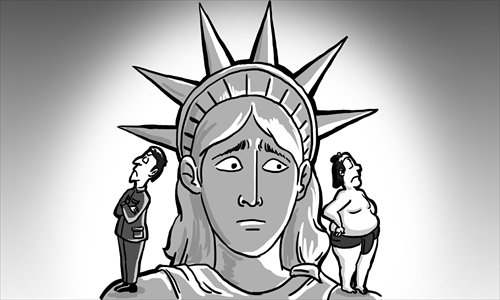
The direction that Sino-U.S. relations takes is not determined by China alone. It’s impolite not to give back what one receives. The U.S. should fully comprehend the rich meaning of this Chinese aphorism.
As the saying goes, the truth will come out sooner or later.
On the issue of the Diaoyu Islands, ignoring the truth and failing to distinguish right from wrong, the U.S. took one more step forward down the wrong path.* This is not surprising. After Japan took the risk of making a provocative move, upgrading the issue, China has been warning the U.S. as well as the Asia-Pacific region to speak and act cautiously, arguing that peace and stability come first.
It is not that China has unrealistic fantasies regarding the U.S., nor that China is afraid to face reality. In preparing for the worst and striving for the best, China is employing a strategic soberness and self-possession that show its self-confidence and tolerance. From this point alone, people can firmly grasp China’s spiritual temperament and see that it is a responsible country. They sense the positive energy that the rise of China has brought about through changes in the world pattern.
In recent months, in the face of continued tension surrounding the Diaoyu Islands, the U.S. has held fast to two concepts: denial of any position on the ultimate sovereignty of the Diaoyu Islands and recognition of Japan’s administrative jurisdiction over them. Now the U.S. has added one more: opposition to any unilateral action seeking to undermine Japan’s administrative jurisdiction.
What caused the U.S to change its position? What does so-called unilateral action mean? What kind of measure will the U.S. take to oppose it? Rather than indiscriminately pushing the blame for rising tensions onto China, does the U.S. have the courage to uncover the mystery of the problems mentioned above? It is obvious that this paradoxical position is upsetting the situation while making no contribution toward solving the problem.
China has a history of avoiding bringing itself trouble, but it also has a history of refusing to fear anything. This the U.S. should know. After all, it has dealt with China for far more than one or two days.
The Sino-U.S. relationship is one of the world’s most important and most complex bilateral relationships. This judgment is recognized by both sides. Presumably, the U.S. is not just joking. Faced with this pair of countries engaged in such an important and complex relationship, the U.S. should demonstrate enough prudence and speak only after deliberation. Seeking speed and acting impetuously conflicts with the status of the U.S., is detrimental to its strategic interests and is irresponsible with regard to the stability of the Asia-Pacific region and the world.
In this new situation, both China and the U.S. must have the courage to face reality, accumulate positive energy and strive to build a mutually respectful, win-win partnership to pioneer new prospects for continuing to build a relationship between these two big powers. This is China’s principal position on Sino-U.S. relations; however, the direction that Sino-U.S. relations takes is not determined by China alone. It’s impolite not to give back what one receives.
Everything has its bottom line. In the matter of territorial sovereignty, no matter who it is, China will not retreat or make room for compromise. The U.S. should and must know clearly what the Diaoyu Islands mean to China. On this issue, the U.S. carries the historical burden of “underhanded secret dealings.” We advise the U.S. not to let it weigh on its mind and not to let itself be kidnapped by Japan, disrupting the overall Sino-U.S. relationship due to a sudden impulse.
*Editor’s note: The Diaoyu Islands are the Chinese name for the Senkaku Islands.

Leave a Reply
You must be logged in to post a comment.